| Srl | Item |
| 1 |
ID:
130046


|
|
|
|
|
| Publication |
2014.
|
| Summary/Abstract |
At the beginning of the space age, the United States relied upon the general acceptance of a sanctuary narrative of outer space in order to help support its reconnaissance activities over the Soviet Union. The notion that space could be a sanctuary thus served as a diplomatic tactic, one designed to thwart Soviet opposition to American overflight. While the Soviets eventually achieved parity-having later acquired the ability to surveil the United States-the notion of sanctuary became untenable once the Soviet Union began to further leverage space power for the aim of attacking American satellites and naval assets. The crucial moment, as revealed in recently declassified documents, occurred in 1976 when the Ford Administration recognized the need for an American anti-satellite capability. Subsequently, while the Carter Administration appeared to pursue comprehensive space arms control, what was really in play was a gambit, one designed to eliminate the Soviet's co-orbital anti-satellite capability and maintain strategic parity in space.
|
|
|
|
|
|
|
|
|
|
|
|
|
|
|
|
| 2 |
ID:
130048
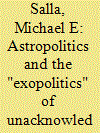

|
|
|
|
|
| Publication |
2014.
|
| Summary/Abstract |
The role of unacknowledged classified programs remains an enigma for fully understanding activities in space and the study of astropolitics. Classified programs by law are not publicly announced, and remain inaccessible to all except those with valid security clearances to be briefed about them. In the United States, waived Unacknowledged Special Access Programs are the most highly classified programs conducted by the military and intelligence community. The same classification protocols are also required of private contractors working with U.S. military departments and intelligence agencies on classified programs. As space continues to grow in its national security significance, the number of these unacknowledged programs pertaining to space is likely to grow significantly from its current number. This requires adopting the necessary conceptual tools and methodological flexibility for investigating unacknowledged activities in space. This also extends to evidence concerning unidentified flying objects and extraterrestrial life. This article suggests that "exopolitics" is a unique multidisciplinary approach to extraterrestrial life that offers a helpful set of conceptual tools for studying unacknowledged space activities, and complements the field of astropolitics.
|
|
|
|
|
|
|
|
|
|
|
|
|
|
|
|
| 3 |
ID:
130045
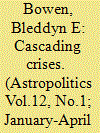

|
|
|
|
|
| Publication |
2014.
|
| Summary/Abstract |
The term space security is often used, but seldom analyzed. This is a significant gap in the literature of space politics, as it posits considerable implications for debates on how to deal with a runaway growth in the space debris population, and how we argue for or against space weaponization. Securitizing all threats in space may lead to greater difficulties in enacting debris removal measures, as these systems are inherently dual-use. A case is made for keeping space security in its traditional connotations of national security so that environmental issues related to orbital debris can be resolved with reduced security concerns in a space development framing.
|
|
|
|
|
|
|
|
|
|
|
|
|
|
|
|
| 4 |
ID:
130043
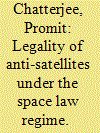

|
|
|
|
|
| Publication |
2014.
|
| Summary/Abstract |
The term anti-satellite, or in short ASAT, is used to refer to a system designed to destroy or damage satellites. The heightened tendency among the spacefaring nations to develop ASAT technology in the recent past has led to widespread debates as to the legality of ASAT deployment under the space law regime. In this context, I have endeavored to make a detailed analysis of the international legal provisions to find if there is any legal basis at all for the deployment of such ASATs. I have concluded that none of the existing legal provisions in space law, as well as public international law, have sufficient force and clarity to bring about a blanket ban on ASAT weapons. Therefore, the research suggests a slew of reforms to overcome this anomaly. Examples of such proposed reforms include, inter alia, an amendment of the Outer Space Treaty and an enhanced role and influence of the United Nations in treaty making coupled with active diplomatic initiatives.
|
|
|
|
|
|
|
|
|
|
|
|
|
|
|
|
| 5 |
ID:
130047
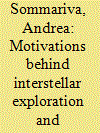

|
|
|
|
|
| Publication |
2014.
|
| Summary/Abstract |
This article analyzes the main motivations behind manned interstellar exploration. There is a wide range of justifications for manned interstellar exploration. Some observers contend that the main reasons are the survival of the human species and the spreading of life in the universe. I argue that the survival of the human species is a very long-term threat and, as such, it is not the main driver for interstellar exploration within a reasonable time horizon. The discovery of habitable planets within 5 to 15 light years from Earth and the possibility that Earth will no longer define the limit of growth constitute stronger motivations. I argue that manned interstellar exploration will be achieved through the mobilization of both public and private resources, as in the past opening of new frontiers, with governments providing initial support in exploration and science, in advancing critical technologies, and in building space infrastructure. The private sector would then take the lead in creating new markets and in expanding humanity's presence in space.
|
|
|
|
|
|
|
|
|
|
|
|
|
|
|
|
| 6 |
ID:
130041
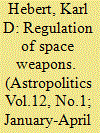

|
|
|
|
|
| Publication |
2014.
|
| Summary/Abstract |
The use of outer space continues to grow and is becoming more congested, competitive, and contested. This results in an increased need to ensure its protection. Existing international laws do not adequately regulate debris-causing space weapons and only provide restrictions for weapons of mass destruction. This article argues that there is a valid need to regulate space weapons, given the destabilizing effects of space weapons and the overall threat to the space environment. The article culminates with recommended courses of action for how to regulate space weapons.
|
|
|
|
|
|
|
|
|
|
|
|
|
|
|
|